- Home
- Dave Bowman
Fight to Be Free Page 9
Fight to Be Free Read online
Page 9
Anne ventured to poke her head up enough to look out the back window.
“Thank God, we’re safe now,” she said.
Daniel looked at her with big eyes. He was panicked.
His hands shook as he tried to steer and keep the truck steady on the road. He felt dizzy and disoriented, but he pushed himself to keep driving. He had to get them as far away as possible. They couldn’t stop now – what if those crazy people had a vehicle to follow them?
“What is it?” Anne asked as her gaze fell on Daniel, who was turning white.
Her eyes moved to the red splatter on the seat behind her son. She jumped. Her fading terror was instantly restored tenfold.
“Oh my God, you’ve been shot!”
19
The road seemed to be never-ending. Nick and Jessa drove the two trucks through the white-knuckle mountain passes all morning and well into the afternoon. The hunger and fatigue were bad enough, but the tension and fear of running into another SUV full of gang members took their toll on the eight travelers.
“I’ve got to lie down,” Bethany said suddenly as Jessa began to ascend another steep hill in the Forest Service truck. “I can’t go any farther without some rest.”
Jessa glanced at her, taking her eyes off the road momentarily. She saw the fatigue and pain etched in Bethany’s face. She gripped her round belly as she shuffled in her seat, trying to relieve the sciatic nerve pain running down her leg.
Jessa bit her lip. She didn’t want to push a thirty-seven-week pregnant woman to do more than she could. In different circumstances, Jessa would have been happy to pull over and find Bethany a place to rest. But there were no empty hotels or houses in sight – there hadn’t been for miles. And stopping to rest in plain sight on the highway would be asking for trouble.
“I know it’s hard,” Jessa said. “But maybe we’ll pass by something soon. There’s got to be a cabin somewhere in these woods. Can you wait just a little longer?”
Bethany grimaced and shook her head.
“No, I can’t take it anymore. I’ve got to get out and rest.”
Jessa knew she was struggling. Bethany wasn’t one to complain much, so Jessa took her words seriously.
Bethany brushed tears away. “I’m sorry, I know I’m a burden. I guess I should have stayed in New Mexico when I had the chance. I’m just slowing everyone down and putting us all in danger.”
Jessa reached over and took her hand, giving it a squeeze. “Don’t worry. We’ll figure something out.”
In the backseat, Liz kept her head down. She had motion sickness from being tossed around on the curvy roads, and being cramped in the close confines of the back seat of the truck made her nausea worse. The idea of getting out and taking a break sounded good to her.
“I’ll flag Nick down,” Jessa said. She flashed her lights and slowed down.
Nick slowed down in the Dodge, and Jessa pulled her truck alongside his.
“Bethany needs to rest,” Jessa said. “She’s feeling really bad and needs to lie down. There was a little dirt road back there about a mile and a half. I think we should drive down there and see if we come across anything. Maybe we’ll get lucky.”
Nick looked at Bethany, who was leaned against her headrest with her eyes closed.
“I’ll follow you,” Nick said.
They turned the trucks around and made it back to the side road that split off the main state road they had been traveling on. It was a nondescript road with no signs. Heavy forest lined it on both sides. It didn’t seem to Jessa that anyone would have built a home down this isolated road, but she hoped for Bethany’s sake that she would be wrong.
They traveled the road for two miles until it ended in a dead end with a small cul-de-sac with room to turn around.
Jessa stopped the truck. Without waiting, Bethany opened her door and stepped down.
“This is a weird road,” Jessa muttered to herself. “Maybe it’s an old Forest Service road they don’t use anymore and stopped maintaining. But that doesn’t make sense…”
“Hey, Jessa,” Liz interrupted. “Can you get out so we can climb out, too?”
“Oh, sorry,” Jessa said, hopping out and moving the seat forward so Liz could climb into the front and stagger out the driver’s side door.
Liz bent over with her hands on her thighs, catching her breath.
“Car sickness?” Jessa asked sympathetically.
Liz nodded, flashing Jessa a weak smile.
Nick and the rest of the group got out of the Dodge. He threw a glance at Bethany, who was leaned over the back of the Chevrolet.
“You all right, Bethany?”
“I could really use a bed right about now,” she said. “I really need to get the weight off my back. It’s killing me.”
“What should we do?” asked Charlie. “We haven’t seen anything since we left the ski lodge. It’s totally deserted out here. I had no idea the wilderness out here was so… big.”
Nick looked at Jessa, then away. He thought of his wife Kaitlyn’s pregnancy. It had been difficult for her, especially at the end when she was miserable with back pain and exhaustion.
“We still have a little camping gear,” Nick said. “We could set up a tent with a sleeping bag and a pad underneath. Would that help?”
Bethany’s face lit up and she nodded enthusiastically. “That would be great.”
Nick found a spot off the road big enough for the tent, then he got started assembling it. Bethany looked at the tent nestled among the trees spread out across a blanket of pine needles, and her lip quivered.
“Thank you so much. It’s perfect,” she said. “I feel so bad you guys have to wait for me like this.”
“Go lie down already,” Jessa said playfully. “And quit apologizing.”
Bethany nodded and crawled in the tent.
“There’s room in here for someone else, you know,” Bethany called out over her shoulder. “In case anyone else needs a nap. I’m big, but I’m not that big.”
Liz looked down at Mia, whose eyes were heavy.
“Why don’t you go take a nap?” Liz asked. “You look so sleepy.”
Mia smiled sheepishly and looked at Jessa, who shooed her toward the tent.
“Better rest up now, kiddo,” Jessa said.
Mia climbed in the tent behind Bethany and got settled. Jessa zipped up the netting to keep the mosquitoes out.
“It’s kind of a relief to be off the main road for a while,” Liz said, sitting on the rear bumper of the Chevy. “I felt like we were going to run into the BSC around every corner.”
“Yeah, me too,” Charlie said.
“Are we even going to make it out of here today?” Matt asked. “I feel like we’re not making good time.”
“We’re not,” Nick said. “The maps don’t show the topography. So we underestimated the travel time. With these roads as curvy and dangerous as they are, we can’t go as fast as we thought.”
“So we’re going to have to spend the night up here?” Jessa asked.
“Maybe,” Nick said, pulling his map out and giving it a quick study.
He sighed. That landslide blocking the southern route had really thrown them a curveball. The northern route they were now on was much longer. Not to mention it was apparently guarded by the BSC.
He folded the map up. Depending on how long Bethany needed to rest, the chances were looking slim that they’d make it out of the mountains that day. And that meant they’d need to spend time hunting, which would delay them even more.
“I think some of us better go ahead and scout the area while the rest of you rest,” he said. “Make sure the next few miles on the main road are clear. We can check out some more of the side streets like Trina suggested earlier. Maybe we’ll get lucky and find some cabin tucked away down one of these little roads.”
“I’ll go with you,” Jessa said.
“Me, too,” Matt volunteered.
“I’ll go,” Liz offered. “As long as I can sit up f
ront this time.”
Jessa smiled. “Sure, I’ll take the back.”
“So that leaves Trina and Charlie. Are you two OK with keeping watch while Bethany and Mia rest?” Nick asked.
“Sure,” Charlie said. “We can hold down the fort. Right, Trina?”
“Of course,” Trina said.
Nick grabbed a suitcase out of the cargo bed of the Forest Service truck. “No sense in hauling around all this stuff if we’re coming right back. We’ll save on gas this way.”
They unloaded some of the weight from the back, then Nick, Jessa, Liz and Matt climbed in the truck.
“We should be back before too long,” Nick said to Trina and Charlie who watched them load up. “If we can’t find anything after an hour, we’ll turn around and come back here.”
Charlie gave a big, goofy wave as they pulled out. “Stay safe.”
He and Trina watched as the truck disappeared down the dusty road, leaving them in the silence of the forest again.
Trina grabbed her rifle and sat down on the forest floor, leaning against a tree. “Doesn’t seem much point in keeping watch out here. No one’s coming down that road except Nick. And even if someone did, we’d hear them a mile away.”
Charlie grinned and picked his own pine tree to lean against, keeping his rifle within reach. “I thought you would’ve learned by now, Trina.”
“What’s that?”
“Things go wrong when you least expect them.”
“I suppose you’re right,” Trina said. She looked at the rifle she had placed on the ground and brought it a little closer.
20
Garrison Reynolds could scarcely contain his excitement.
Everything had been worth this opportunity. All the loneliness, all the rejection from his peers.
Finally, he would come out on top. His lonely existence was going to change at last.
An assistant professor at the University of Colorado, he was used to leading a solitary life. Of course, being an immunologist made it difficult to make friends with the public at large. Most people weren’t interested in hearing about cell structure. And he had never quite learned how to make small talk.
But he could never fit in with his colleagues, either. He was ostracized in undergrad, shunned in graduate school. As a professor and scientist, he was respected for his rigorous research and teaching style. But for some reason, the other members of his academic world avoided him.
It troubled him to no end, and he never understood why. Over the years, he had chalked it up to his position at the top. Genius was isolating. Other people just envied his brilliance. He heard some whispers once or twice. It was easy for them to call him crazy. People feared what they couldn’t understand.
Maybe it was his interest in guns and outdoor survival. He wasn’t like his colleagues, who seemed to trust the government blindly. Every time he talked about the collapse of civilization, people gave him strange looks. So he kept to himself more and more.
He had tried to be content in his solitude. He poured himself into his work and his hobbies. He told himself he didn’t mind living alone and keeping to himself. But he couldn’t shake the feeling that something was missing.
As he got into his thirties, and then forties, he saw the people around him finding spouses and having kids. Yes, that was what he needed. A family.
Then he wouldn’t feel so alone. He needed someone to share his life with.
But women just weren’t interested in him. They never had been. He didn’t understand it. He was lean and fit. At forty-four, he was losing some hair, but he wasn’t bad-looking.
Still, though, women seemed nervous, uneasy, around him. It was almost as if they were afraid of him.
He had all but given up on the idea. Instead, he began to focus his energy toward his future. If society rejected him, he wanted nothing to do with it. He would begin to prepare for what he had always known was coming: the end of the American lifestyle.
Several years ago, he had bought a remote property with his meager savings. It was buried in the woods with only a small dirt road leading up to it. With a natural spring on the land, he would have access to the best water. And of course, the end of civilization would destroy any access to gridded electricity, so he didn’t worry about that either.
He was able to build a simple cabin during a sabbatical from the university, and since then had been working to improve it. Most weekends he drove out from Denver to work on the endless projects he had to improve it. Recently he had set up a solar system.
The property was extremely remote, tucked away among the wilderness southwest of Denver. After completing construction of the cabin several years back, he had let the long road leading up to the edge of his property grow over. He began parking his truck in a small clearing a few dozen yards past the end of the state road. Garrison would cover the truck with a few camouflage tarps, then drag limbs, saplings, and forest debris on top of that. A few more limbs and dead logs over the narrow path he drove in on to park the truck, and his tracks were covered. The path, and his truck, were nearly invisible to the casual observer.
The rest of the way to the cabin was covered in untouched woods. He took a different route each time he walked between his truck and his cabin so that there was no path.
It was a long distance with lots of twists and turns. After a while, he knew the woods like the back of his hand. Even better, it had become difficult for anyone else to locate the cabin with no trails leading up to it and its location so far from the state road.
It was just as he liked it. He didn’t want just anyone to find him here.
When the Hosta virus broke out, he was stunned. But he wasn’t surprised.
Like the research facilities the world over, his lab tried to help. He and the other scientists in his department began to work furiously for a cure. He had tried to warn his colleagues that something like this was bound to happen, but no one had ever listened. And when it finally did happen, they didn’t even have the decency to admit he had been right all along.
Despite his bitterness, he tried his best to develop an effective antiviral therapy. Once Denver had its first Hosta case, they isolated the virus and studied it day and night. Camping out in the lab, Garrison worked endlessly.
Garrison’s team tried an experimental therapy in infected mice to stop the virus from reproducing within cells. The new technology programmed cells to die – essentially, commit suicide – when coming in contact with Hosta. When that didn’t work, they tried protease inhibitors.
But nothing worked. The Hosta molecule developed resistance to any antiviral agents. The researchers watched the mice die faster and faster.
Then, the scientists began to die.
When Garrison saw his coworkers wake up with discolored skin, he knew there was no escape. Despite their highest security and most rigorous safety protocols, the virus had resisted their attempts to contain it. To call it highly communicative was an understatement. There was no point in trying to enter a quarantine once the virus had gotten within a several mile radius.
A handful of mice survived even with exposure to the virus, and it gave Garrison hope. A four percent survival rate was determined. While everyone around him had gray skin and bulging eyes, Garrison remained healthy.
He had always been the odd person out. Why should his immune system be any different?
He watched the news reports alone in the laboratory as panic spread across the world. There wasn’t a single researcher that could stop this thing. Politicians cautioned citizens to not panic, until the politicians disappeared – gone underground in a futile attempt to quarantine, Garrison assumed.
People argued on the news about the likely cause of the virus. But Garrison figured it was the North Koreans. He had heard speculation over the years of them trying to develop a biological weapon. He reckoned they had finally succeeded.
In any case, the news broadcasts didn’t last long. Soon, there were no more updates on the TV, radio, or interne
t. Then the power went off.
Whatever the reason, the Hosta virus was out of control. There was no cure that he could conceive of, and most of Denver was dying.
His little house in town was near the university. He started to hear gunshots more frequently. A fraction of the population was left, and they were killing each other. There was no reason left to stay.
He packed up what he had, which wasn’t much. His city house had been mostly empty. He wanted to bring more food with him to his mountain home to supplement his supplies. But he quickly found that all the supermarkets and convenience stores were under gang control. He decided it wasn’t a big problem. His supplies at the cabin were decent. And anyway, it would force him to spend more time hunting and trapping. He’d make it through the winter with wild game, then he’d plant a garden in the spring.
The issue of his medicine, however, was a problem. He didn’t have much of his drug left. And the pharmacies were guarded by gangs as well. He didn’t want to tangle with them, so he gave up on the idea of stocking up. He’d have to find a way to live without his prescription drug. He’d be all right.
It was time for him to start a new life away from everything. He regretted that he had no family to share his life with. On the other hand, there would be no one in the woods to call him crazy. No one to reject him. That part, at least, would be a relief.
Garrison retreated to the woods. He ran out of his pills quickly. But he was amazed to find that he felt much better off them. He was more vibrant and creative. His senses were sharper. He laughed to himself when he realized that he hadn’t needed the medication after all.
At some point after being alone in the cabin, his ideas started to change. He had a feeling that he would find his family after all. He didn’t know how yet, but some part of him was sure that he would have a wife and child. They would come to him.
The longer he spent up in his hideaway, the more changes he saw in himself. He started to feel confident, invincible. This would be his time to shine. Finally, Garrison would have the life he had always deserved. It took a virus that wiped out modern society to finally bring him justice.

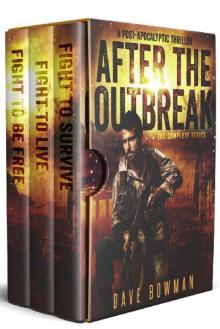 After the Outbreak- The Complete Series
After the Outbreak- The Complete Series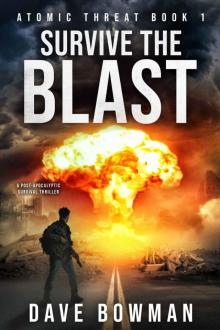 Survive the Blast
Survive the Blast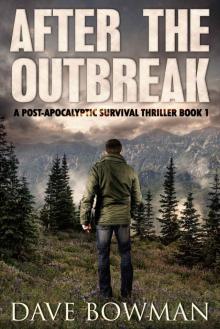 After the Outbreak (Book 1)
After the Outbreak (Book 1)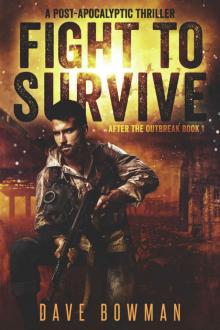 Fight to Survive: A Post-Apocalyptic Thriller (After the Outbreak Book 1)
Fight to Survive: A Post-Apocalyptic Thriller (After the Outbreak Book 1)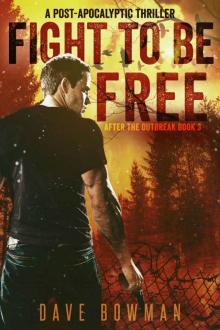 Fight to Be Free
Fight to Be Free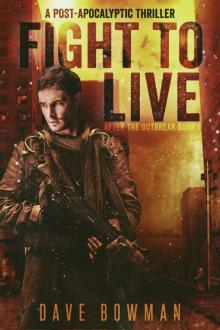 Fight to Live: A Post-Apocalyptic Thriller (After the Outbreak Book 2)
Fight to Live: A Post-Apocalyptic Thriller (After the Outbreak Book 2)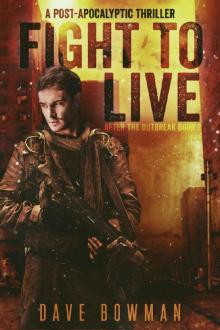 Fight to Live
Fight to Live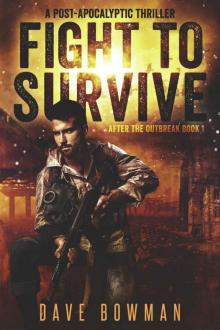 Fight to Survive
Fight to Survive